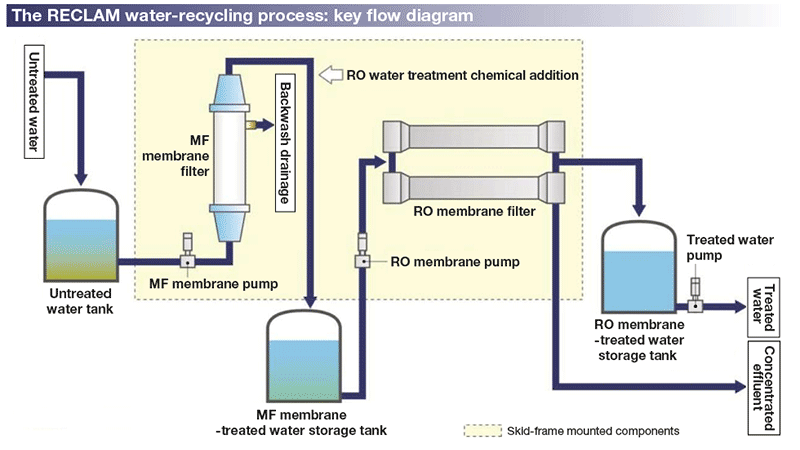Industrial Waste Water Treatment-- Enhance Efficiency with Custom-made Water Treatment Equipments
Industrial Waste Water Treatment-- Enhance Efficiency with Custom-made Water Treatment Equipments
Blog Article
Technologies and Developments in Industrial Waste Water Therapy Technologies
The landscape of industrial wastewater treatment is going through a transformative shift, driven by developments that improve both effectiveness and sustainability. As regulative requirements develop, the combination of AI and device knowing into wastewater management systems promises to ensure and streamline procedures conformity.
Introduction of Drainage Treatment Technologies
Wastewater treatment technologies incorporate an array of techniques developed to remove contaminants from commercial effluents prior to their release right into the setting. These innovations are vital for maintaining eco-friendly equilibrium and guaranteeing compliance with ecological guidelines. The primary categories of wastewater therapy include physical, chemical, and biological approaches, each serving distinct functions based on the nature of the impurities existing.

Biological therapy approaches employ microorganisms to break down natural issue, making them specifically effective for organic-rich effluents. Techniques like triggered sludge and biofilm activators harness the all-natural destruction capacities of bacteria, leading to considerable decreases in biochemical oxygen demand (BOD)
Advanced Purification Strategies
Advanced filtering strategies stand for a critical evolution in the realm of industrial wastewater treatment, enhancing the efficiency of contaminant removal processes. Industrial Waste Water Treatment. These methods encompass a series of technologies, including microfiltration, ultrafiltration, nanofiltration, and reverse osmosis, which provide consecutive obstacles for numerous fragment dimensions and chemical frameworks
Microfiltration and ultrafiltration use membrane systems to remove suspended solids, microorganisms, and bigger natural molecules, improving the quality of effluent prior to more therapy. Nanofiltration connects the space between ultrafiltration and turn around osmosis, properly getting rid of divalent ions and natural compounds, therefore decreasing the tons on downstream processes.
Reverse osmosis supplies the highest degree of purification by allowing just water and little molecules to travel through its semi-permeable membrane layers, making it perfect for redeeming high-quality water from commercial effluents. Recent advancements in membrane layer innovation, including the growth of more durable and fouling-resistant materials, have actually substantially improved functional effectiveness and decreased prices.
Integrating these innovative filtering strategies not only enhances the general therapy process yet likewise adds to sustainability efforts by enabling water reuse and resource recuperation in industrial setups. (Industrial Waste Water Treatment)
Biological Therapy Innovations

In addition, the advancement of engineered organic systems, such as membrane bioreactors (MBRs), combines organic treatment with innovative membrane layer filtration. This assimilation permits greater effluent high quality and reduced impact, making it appropriate for space-constrained commercial facilities. Technologies in genetically engineered microorganisms have also emerged, boosting the biodegradation of certain contaminants, such as drugs and heavy steels, that are traditionally testing to remove.
In addition, the implementation of bioaugmentation methods, where advantageous germs are introduced to improve the existing organic treatment procedures, has shown encouraging results in enhancing therapy performance. These advancements collectively symbolize a fad towards even more lasting and efficient organic treatment methods that can adjust to the evolving complexities of commercial wastewater streams. As sectors continue to prioritize environmental conformity, these organic technologies will play a crucial function in wastewater monitoring.

Resource Recuperation Methods
In commercial settings, the integration of resource recuperation methods has actually ended up being progressively essential for improving sustainability and minimizing waste. These approaches focus on removing important products and energy from wastewater streams, therefore transforming possible pollutants right into reusable sources.
One prominent technique is nutrient healing, where nitrogen and phosphorus, often existing over in wastewater, are captured and transformed right into fertilizers. This not just reduces environmental influences but likewise gives a circular economic climate remedy for agricultural applications. Furthermore, modern technologies such as anaerobic digestion enable for the conversion of natural waste into biogas, a sustainable power resource that can offset fossil fuel use in commercial procedures.
Furthermore, advanced filtering and membrane layer technologies promote the healing of commercial byproducts such as metals and salts. These recovered materials can be rehabilitated right into manufacturing procedures, reducing the need for virgin resources.
Future Patterns in Waste Water Administration
As sectors significantly focus on sustainability, the future of wastewater monitoring is readied to undergo significant improvements. Technical improvements, such as expert system and artificial intelligence, see it here will enable more efficient monitoring and management of wastewater systems. These technologies can predict upkeep demands, maximize therapy procedures, and improve decision-making, eventually decreasing operational costs and ecological influence.
Additionally, the combination of circular economy principles will certainly play a critical duty in wastewater administration. Industries are expected to shift in the direction of systems that not just treat wastewater but also recoup useful resources, such as nutrients, water, and energy. This change will certainly reduce waste and promote the reuse content of products, lining up with global sustainability objectives.
Emerging treatment strategies, such as membrane bioreactors and advanced oxidation procedures, will further boost the efficiency of wastewater therapy, permitting better effluents appropriate for reuse. Additionally, governing structures are likely to advance, highlighting stricter requirements for wastewater discharge and encouraging markets to adopt cutting-edge treatment remedies.
Final Thought
In final thought, the advancement of commercial wastewater therapy technologies demonstrates a considerable change in the direction of boosted efficiency and sustainability (Industrial Waste Water Treatment). Developments in sophisticated purification strategies, organic therapies, and resource recovery methods highlight the industry's commitment to environmental stewardship.
The landscape of industrial wastewater treatment is going through a transformative shift, driven by advancements that improve both performance and sustainability.Wastewater therapy innovations incorporate a variety of methods made to eliminate pollutants from industrial effluents prior to their launch into the setting.Using the power of organic processes has actually led to considerable technologies in the therapy of commercial wastewater.Furthermore, the execution of bioaugmentation techniques, where beneficial germs are introduced to improve the existing biological treatment procedures, has revealed appealing Your Domain Name results in improving therapy efficiency. These advancements collectively signify a trend in the direction of more reliable and sustainable biological therapy methods that can adapt to the evolving intricacies of industrial wastewater streams.
Report this page